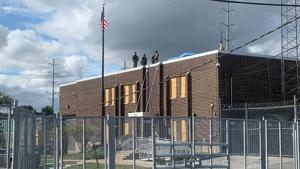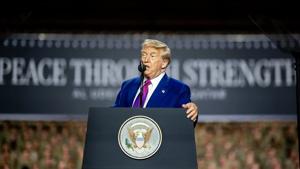
Trump signs bill studying cancer among military pilots
President Donald Trump has signed into law the Aviator Cancer Examination Study Act, which seeks to address cancer rates among former and current military aircrew members.
According to an Air Force study, these individuals experienced higher rates of melanoma, thyroid cancer and prostate cancer.
Building upon this study, the ACES Act requires the secretary of veterans affairs to investigate cancer and mortality rates for aircrew members who have served in the Navy, Air Force and Marine Corps.
The specific cancers the study will look into are melanoma, thyroid cancer, prostate cancer and others. The ACES Act is designed to help understand the link between certain types of cancers and military services.
U.S. Sens. Mark Kelly, D-Arizona, and Tom Cotton, R-Arkansas, who are both veterans, introduced this bill.
Kelly, a former Navy pilot, said, “Veteran aviators and aircrews deserve answers about the correlation between their job and cancer risks.”
“Getting this across the finish line has been a bipartisan effort from the start, and I’m proud to see this bill become law so we can deliver real answers and accountability for those who served,” he said.
Cotton, who was an Army infantry officer, said he was “grateful” to the president for making the ACES Act “the law of the land.”
“We owe it to past, present, and future aviators in the armed forces to study the prevalence of cancer among this group of veterans,” he explained.
In addition to having bipartisan support, many veteran groups and advocacy groups supported the ACES Act.
Jose Ramos, the Wounded Warrior Project’s vice president for government and community relations, said his organization was “proud to support” this piece of legislation.
He called the ACES Act a “critical step toward ensuring that veterans receive timely diagnoses, specialized screenings and the care they have earned.”
Theo Lawson, the assistant director of legislative programs for the military nonprofit Fleet Reserve Association, said this bill is a vital piece of legislation.
Lawson said the bill “directs critical research into cancer risks among military aircrew, ensuring better care and support for our aviators who have served our nation.”
Latest News Stories

WATCH: Trick or treat: IL legislators pass tax increase, decoupling bill early Friday

Noem refuses Pritzker enforcement pause request, IL passes sanctuary enhancement

WATCH: Energy bill opponents say increases IL electric bills by $8 billion passes

WA Dems blame GOP for government shutdown; 1 million in state could lose SNAP benefits

Officials react to allegations of civilians impersonating ICE

Illinois quick hits: IL taxpayers have highest pension debt obligations in U.S.

WATCH: Bonta visits food bank amid lawsuit over CalFresh

IL taxpayers to pay $20M for food banks as SNAP funding lapses start Saturday

Poll: 7 in 10 of Americans are against mail-order abortion without a doctor visit

Trump’s plan to re-start nuclear weapons testing faces criticism

Illinois quick hits: Corrections director appointment approved; Clean Slate Act passes

Tyler Robinson’s in-person hearing delayed to January


